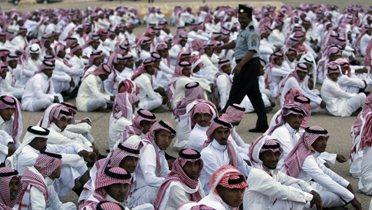Content from the Brookings Doha Center is now archived. In September 2021, after 14 years of impactful partnership, Brookings and the Brookings Doha Center announced that they were ending their affiliation. The Brookings Doha Center is now the Middle East Council on Global Affairs, a separate public policy institution based in Qatar.
INTRODUCTION
Saudi Arabia stands out among Gulf monarchies due to the size of its polity, its strategic influence in and outside the Gulf, and its unique influence in the Muslim world as the keeper of the two holiest sites in Islam: Mecca and Medina. There are also substantial pressures affecting the status quo relationship between the monarchy and various societal forces. The burgeoning youth population is straining the capacity of the Saudi welfare state at the same time as it is becoming more urban and educated—all characteristics of other societies that have experienced political upheaval.
Contrary to received wisdom, oil does not render the Al-Saud regime immune to popular discontent. As the winds of revolution sweep the Middle East, Saudi Arabia is facing immense strains on its traditional ruling balance. It is thus crucial to understand the possibilities and limits of the monarchy’s ability to adapt to these mounting challenges.
Several factors indicate that social unrest in the kingdom will remain limited to small pockets for the near future. These include largely co-opted elites, divided opposition movements, and the popularity of King Abdullah. However, many of the underlying factors for instability are growing more evident, and if not addressed could conflagrate with a catalyzing event—such as a succession crisis. Political liberalization to improve governance and accountability is potentially destabilizing in the short run but necessary for long-term stability given the array of pressures facing Saudi Arabia. The Al-Saud regime is entering a crucial moment in its history; how it navigates this crisis will have profound effects for both the monarchy and the Saudi Arabian state in the years to come.
This paper will provide background as to how the Al-Saud regime has recently managed social unrest in the kingdom. It will then briefly detail the various reform movements within the kingdom, their demands, and relative influence with the regime. It will conclude by examining the scope of institutional reform efforts under King Abdullah and the prospects for political liberalization in an increasingly tumultuous domestic and regional environment.
The Brookings Institution is committed to quality, independence, and impact.
We are supported by a diverse array of funders. In line with our values and policies, each Brookings publication represents the sole views of its author(s).



